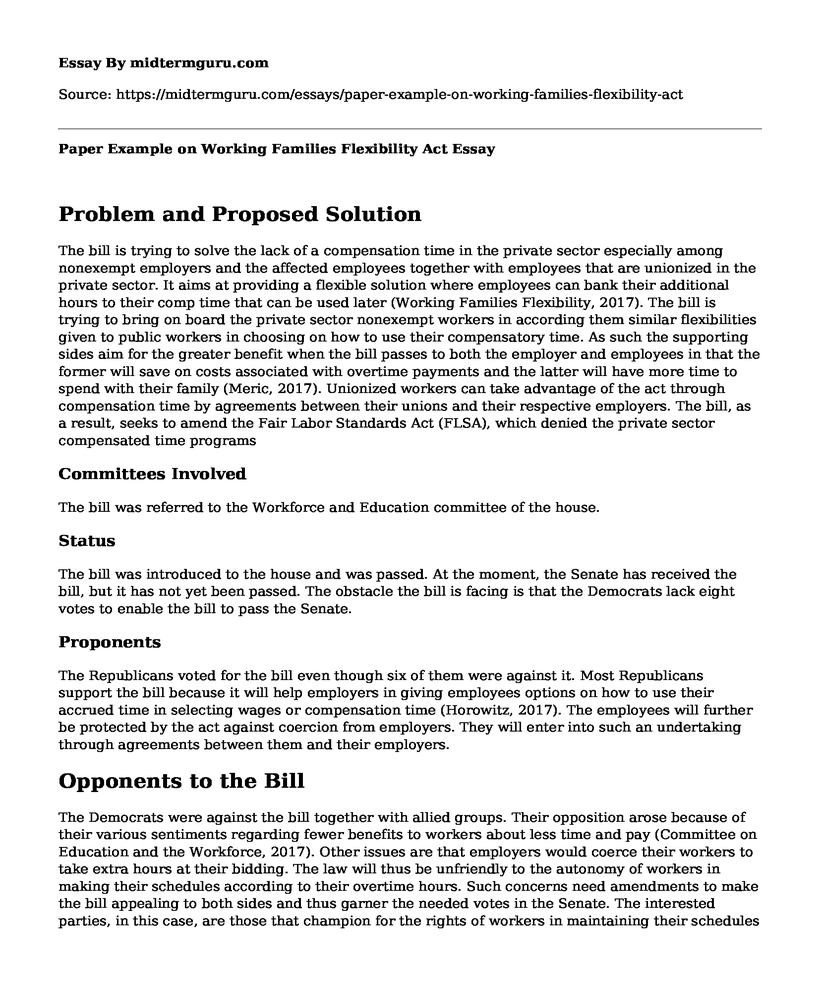Problem and Proposed Solution
The bill is trying to solve the lack of a compensation time in the private sector especially among nonexempt employers and the affected employees together with employees that are unionized in the private sector. It aims at providing a flexible solution where employees can bank their additional hours to their comp time that can be used later (Working Families Flexibility, 2017). The bill is trying to bring on board the private sector nonexempt workers in according them similar flexibilities given to public workers in choosing on how to use their compensatory time. As such the supporting sides aim for the greater benefit when the bill passes to both the employer and employees in that the former will save on costs associated with overtime payments and the latter will have more time to spend with their family (Meric, 2017). Unionized workers can take advantage of the act through compensation time by agreements between their unions and their respective employers. The bill, as a result, seeks to amend the Fair Labor Standards Act (FLSA), which denied the private sector compensated time programs
Committees Involved
The bill was referred to the Workforce and Education committee of the house.
Status
The bill was introduced to the house and was passed. At the moment, the Senate has received the bill, but it has not yet been passed. The obstacle the bill is facing is that the Democrats lack eight votes to enable the bill to pass the Senate.
Proponents
The Republicans voted for the bill even though six of them were against it. Most Republicans support the bill because it will help employers in giving employees options on how to use their accrued time in selecting wages or compensation time (Horowitz, 2017). The employees will further be protected by the act against coercion from employers. They will enter into such an undertaking through agreements between them and their employers.
Opponents to the Bill
The Democrats were against the bill together with allied groups. Their opposition arose because of their various sentiments regarding fewer benefits to workers about less time and pay (Committee on Education and the Workforce, 2017). Other issues are that employers would coerce their workers to take extra hours at their bidding. The law will thus be unfriendly to the autonomy of workers in making their schedules according to their overtime hours. Such concerns need amendments to make the bill appealing to both sides and thus garner the needed votes in the Senate. The interested parties, in this case, are those that champion for the rights of workers in maintaining their schedules and obtaining better bargaining agreements and compensation mechanisms.
What Do You Think About It?
Most concerns regarding the bill include the little flexibility workers have about their compensation time or overtime payments. Most of the women according to various concerns raised by Democrats and allied groups will not benefit from the compensation time particularly those who are in the low-income bracket. Therefore in light of the rising concerns, I think that the bill should be amended to protect the private sector workers in giving them more leverage about managing their compensation time. The time can be spread through the various days that will benefit the individuals particularly about their schedules and events, which may be planned, or not. As a result, it is important for the consideration of compensation time to be analyzed further to come up with a law that favors all workers particularly women who have to take time off work most of the time. As a senator, I would vote against the bill until it is amended to be more beneficial to the workers particularly those in the low-income cadre.
References
Calder, V. B. (2017, May 30).How paid family leave hurts women. CNN. Retrieved from https://edition.cnn.com/2017/05/30/opinions/trump-budget-paid-leave-calder-opinion/index.html
Horowitz, J. (2017, May 4). The House just passed a bill that affects overtime pay. CNN. Retrieved from https://money.cnn.com/2017/05/02/news/economy/overtime-pay-bill-passes-house/index.html
Committee on Education and the Workforce (2017, April 24). Myth vs. Fact - The Working Families Flexibility Act of 2017. Retrieved October 30, 2018, from https://edworkforce.house.gov/news/documentsingle.aspx?DocumentID=401574
Meric, L. (2017, April 24). The Working Families Flexibility Act Will Hurt Women And Families: A true misnomer if ever there was one.Huffpost. Retrieved from https://www.huffingtonpost.com/entry/working-families-flexibility-act-will-hurt-women-and_us_58fe4d21e4b086ce589813ef
Working Families Flexibility Act of 2017, H.R. 1180, 115th Cong. (2017)
Cite this page
Paper Example on Working Families Flexibility Act. (2022, Sep 25). Retrieved from https://midtermguru.com/essays/paper-example-on-working-families-flexibility-act
If you are the original author of this essay and no longer wish to have it published on the midtermguru.com website, please click below to request its removal:
- The SARA (Scanning, Analysis, Response and Assessment) Model in a Crime Analyst Work
- Paper Example on Mexico Country
- Paper Example on Secret Reinsurance Treaty with Russia
- Uncertainty: Its Impact on Economy and How to Measure It - Research Paper
- Abraham Lincoln Memorial: Honoring the 16th President - Research Paper
- Socio-Economic Status Impacts Health of Society & Self - Essay Sample
- Health Code Violations: Dangerous for Business and Lives - Essay Sample







